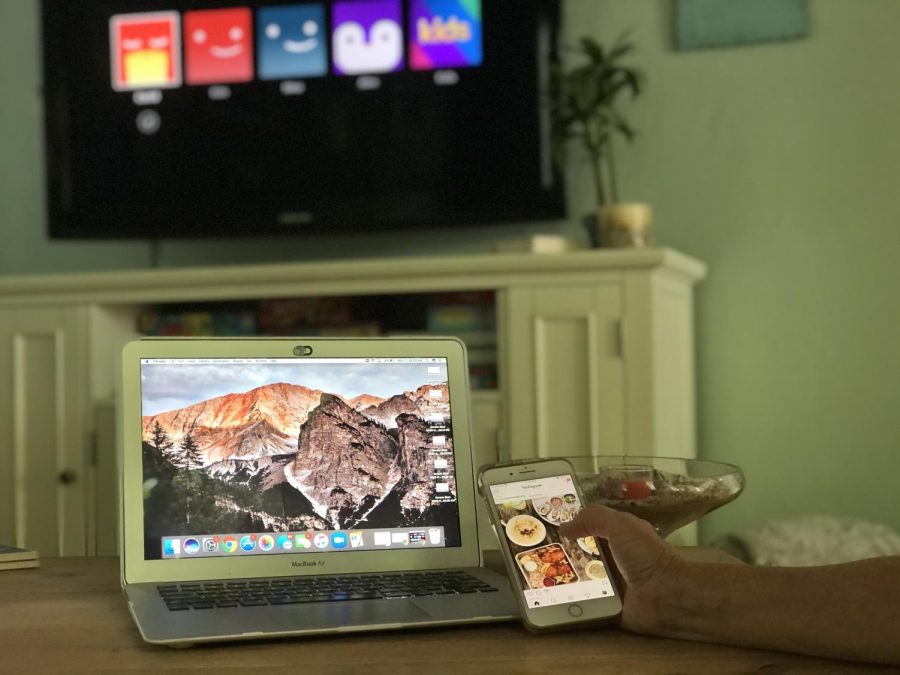Online School Traps Students Behind Screens (And Students Don’t Free Themselves When They Can)
September 28, 2020
Students of all different grades and interests at San Rafael High School have something new in common since the start of this school year. They can’t get off of their screens. The bright blue light of computers, televisions, and phones flood our vision from the moment people wake up until they check that last text at night. It is an endless cycle that controls our days especially during the pandemic. Endless notifications, distractions, and boredom has drastically changed the students’ screen time, and they can’t seem to break the cycle. What is the culprit of this addiction? Many believe it is online school.
“[Online school] has promoted staying on your screens more,” Isabelle Nicandri, a sophomore from SRHS said as she opened up about her experience with online schooling. “Sometimes I feel like I’m in control of my phone use and that I can stop using it, but at the same time, I feel more used to being online. The more I’m on it the more I feel comfortable with it, so I keep increasing my phone use.”
Students are on their computers for almost half of the day during online school. Technology, such as phones and computers, are man-made, and our bodies are not developed to be prepared for this much exposure to screen time. In an article from Harvard Medical School, pediatrician Michael Rich explains that, “‘much of what happens on screen provides impoverished stimulation of the developing brain compared to reality,’ and that ‘children need a diverse menu of online and offline experiences, including the chance to let their minds wander.’” Right now, the students of SRHS are not getting enough time off screens, and are instead glued to them for the rest of the day, which could be harmful to the developing brains and bodies of a high school student. According to Rich, the students cannot take full responsibility for this addiction since “a young person’s brain lacks a fully developed self-control system to help them with stopping this kind of obsessive behavior.”
When asked if he finds time in his day to go outside and get off his screens, freshman at SRHS, Henry Malin said, “Oh, not at all, I stay on for the rest of the day.” Ruby Jobe, a Senior, gave a similar response, saying, “I just stay on my screens, and I don’t really get off them.” A September 14th survey of four advisory classes, across four different grade levels, yielded twenty-seven responses, and the results were overwhelmingly similar.
Students were asked to choose between a few options to describe their school day. Four students reported that, after school, they prioritize spending time outside and away from screens. Fifteen other students responded that they usually stay on their phones or devices for most of the rest of the day. There are significantly more students who find it hard to shut everything off and do something away from their screens. Nicandri says, “In some classes we are online for fifteen minutes and then the teacher says ‘ok do your thing’ and then you finish your work. So you think, what do I do now?” Evidently, most students stay on their screens.
An important question is whether this is a conscious choice, or something much more complicated. Elena Tsingaris, a senior at SRHS, says, “I can easily get sidetracked or distracted when doing homework.” Why? An article from College Info Geek explains that “Even using one computer, you can still watch a video, have eighteen other tabs open, play Spotify in the background, and get notifications from Slack and iMessage at the same time.” Necessary screen uses for school such as Google Docs and Canvas are lumped onto the same devices students use to watch fun videos, talk to friends, and other recreational platforms. Students are constantly fighting the urge to shift their focus to recreational activities on their devices throughout the school day. What makes it even more difficult is that the article claims that “the internet rewards this distracted behavior.” It states that “it’s not just our frequent use of this technology that gives it such a powerful ability to shape our neural pathways — it’s also the fact that using the internet offers constant, quick dopamine hits.”
Screen time, and how students use their devices recreationally throughout the day, has been an increasingly important topic when it comes to online schooling. Students are struggling to get off their screens, and part of the blame can be found in the manipulative tactics the internet offers (as explained above). What is known for sure is that the well-being of our students has been thrown off balance, and the first step is identifying the problem.
“It’s so much better in person, you are just more engaged, but online just everything feels the same,” Nicandri explains about her online school experience. “I kinda feel trapped.”






































